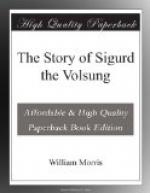Ravening, devouring, eager for prey; often used of wild animals.
Reck, to notice, care about.
Reek, smoke rising from a fire, or spray and mist from a waterfall, e.g. “the reek of the falling flood;” “the heart of Fafnir ... sang among the reek.”
Renown, fame, honour.
Rock-wall, mountain cliff.
Roof-tree, the topmost beam which forms the ridge of a roof.
Rue, to regret, to find a cause of woe.
Rumour, report, gossiping tale.
Rune, letter. The letters used in old Icelandic and similar languages are called runic characters. When written letters were first known in the north of Europe they were supposed to have magic powers, and gradually the word “rune” came to mean any spell, or even any wisdom which was beyond the ordinary knowledge of men.
Ruth, pity, regret, e.g. “Ruth arose in his heart;” “I have hearkened not nor heeded the words of thy fear and thy ruth.”
Salutation, greeting.
Sate, satisfy to the full.
Scalds, the poets who recited poems or stories at feasts.
Scoff, an object of mockery.
Scored, carved, marked by lines cut deeply into a surface.
Sea-beast’s tooth, the tusks of the walrus.
Sea-mead, the wide surface of the sea. The word means sea-meadow.
Seethe, to bubble and move like boiling water.
Semblance, an appearance, outward show where there is no reality.
Serry, to crowd closely together.
Shards, broken fragments, e.g. “the shards of a glaive of battle.”
Shield-burg, a fortress built of shields. Burg means either a town, a castle, or a fortress.
Shield-wall, the defence made by fighting men holding their shields close together as they stand at bay.
Shift, n. a trick, cunning plan, e.g. “my cunning shifts;” n. to contrive, be able, e.g. “the man whose heart and hand may shift, To pluck it from the oak-wood.”
Shimmer, to gleam and change colour as the light alters.
Skerry, a rocky island near the coast.
Slaked, cooled, put out; used of anything that has been burning and is now grown cold.
Sleight, cunning, trickery. Loki is called “the Master of Sleight” because of his skill in deceit.
Sleipnir, Odin’s horse. It was grey, had eight feet, and could carry him over sea and land, and could also fly through the air.
Slot, the track left by a wild animal.
Sloth, idleness.
Smithy, to do the work of a smith, forge weapons.
Sooth, truth.
Sore, very much. It is generally used about things which are evil or painful, but sometimes only to give emphasis, e.g. “amber that the southern men love sore.”




